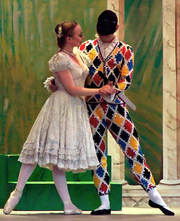|
Home
|
Sep 17, 2018
This week’s themeWords that have many unrelated meanings This week’s words columbine raddle mizzle rummy gage 
Columbine with Harlequin
Photo: Malene Thyssen/Wikimedia 
Columbine flower
Photo: Mike
A.Word.A.Day
with Anu GargShakespeare once wrote, “All the world’s a stage, / And all the men and women merely players: / They have their exits and their entrances; / And one man in his time plays many parts.” He could just as well have been talking about words. A word in its time plays many parts. Words are born -- we call it coining -- and they go on to play many parts. They play these under various parts of speech: consider the word “part”, for example. It can appear on the stage playing a noun role (a body part), as a verb (to part the seas), adjective (part owner), or an adverb (to pay part in kind). If you ask nicely, it might even play other parts of speech it’s not trained in. And that’s not counting multiple roles it plays in each of these parts of speech. That’s all well and good, but all those meanings listed above are similar. What’s more interesting is when a word plays parts that are wildly different -- giving us meanings that show little connection to each other. This week we’ve picked five such words. columbine
PRONUNCIATION:
MEANING:
ETYMOLOGY:
For noun 1, 2: After Colombina, a stock character in commedia dell’arte, the mistress of
Harlequin. From Italian
colombina (small dove, a guileless woman). Earliest documented use: 1723. For noun 3: From the resemblance of an inverted flower to five doves. Earliest documented use: 1325. For adjective: From Latin columba (dove, pigeon). Earliest documented use: 1656. USAGE:
“She was suddenly confronted by a mental image of the Duke dressed in rags,
bowing and dancing with a queen or a columbine and it made her smile.” Mary Nichols; The Incomparable Countess; Mills & Boon; 2012. “She has all the serpentine wisdom and columbine innocence so recommended in the Scriptures in her looks and actions.” Henry Colburn; The American in Paris - Volume 2; 1838. A THOUGHT FOR TODAY:
You have to laugh at the things that hurt you just to keep yourself in
balance, just to keep the world from running you plumb crazy. -Ken Kesey,
novelist (17 Sep 1935-2001)
|
|
Subscriber Services
Awards | Stats | Links | Privacy Policy
Contribute | Advertise
Awards | Stats | Links | Privacy Policy
Contribute | Advertise
© 1994-2026 Wordsmith